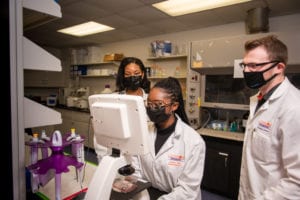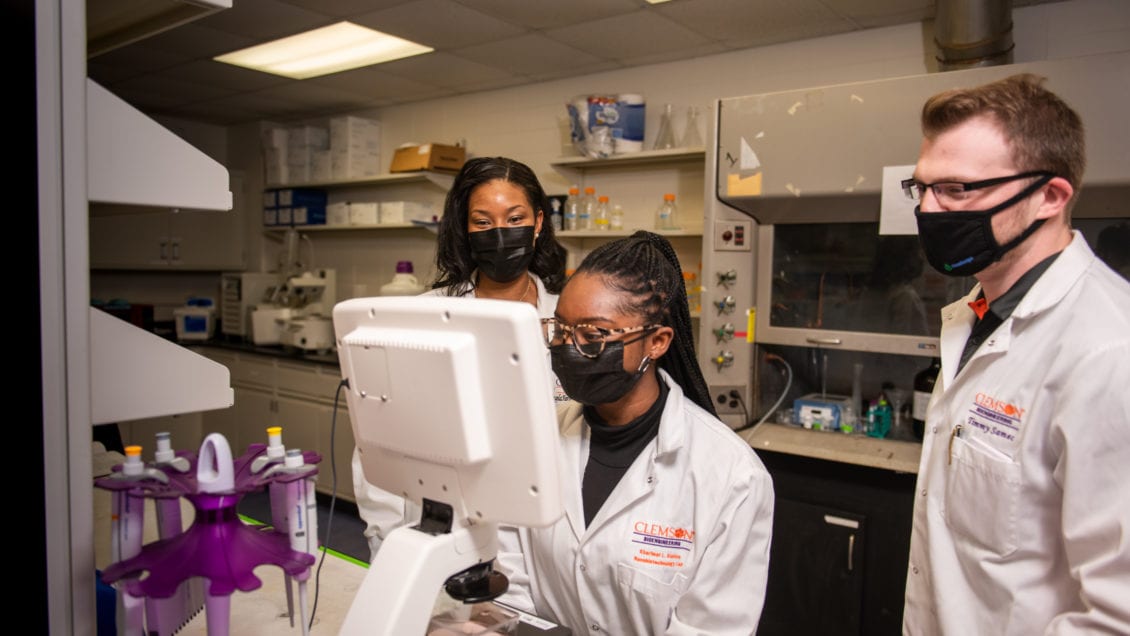Angela Alexander-Bryant of Clemson University is working to develop a new way of delivering medicines directly to cancer cells, raising hopes the disease could be treated more efficiently with fewer side effects.
Alexander-Bryant, an assistant professor of bioengineering, is focusing on cancers that are aggressive and drug resistant, including ovarian cancer. She and her team are creating nanoparticles that would carry nucleic acid-based medicines to cancer cells.
A $587,676 CAREER award from the National Science Foundation is funding the research.

Martine LaBerge, chair of the Department of Bioengineering at Clemson, said CAREER awards are one of the nation’s highest honors for faculty members who are early in their careers.
“CAREER awards are a strong indicator of future success and help recipients build a foundation for leadership,” LaBerge said. “Dr. Alexander-Bryant is highly deserving, and I offer her my deepest congratulations.”
Nucleic acid-based medicines have to overcome several barriers to fight cancer, Alexander-Bryant said. For example, they have to get into the cell, and they have to be protected from degradation, she said.
Alexander-Bryant’s approach is to create nanoparticles made of peptides that are designed to overcome those barriers. Peptides are sequences of amino acids that are linked by peptide bonds.
The nanoparticles will be designed to deliver small-interfering RNA or ribonucleoproteins that can find a specific sequence of messenger RNA and cleave the sequence to prevent the production of proteins, Alexander-Bryant said.

“We’re using nucleic acid therapy to target cancer genes and prevent production of proteins produced by these genes in order to treat the cancer,” she said. “We’re focusing on silencing genes related to drug resistance, proliferation, and metastasis.”
The research will give about four graduate students and eight undergraduates a chance to work on the cutting-edge of health innovation over the five-year life of the grant.
“Most of the students who decide to work in my lab and do this type of research have a passion for treating cancer,” Alexander-Bryant said. “They want to see advancements in cancer treatment. That is a motivating factor for us to do what we do– to see survival rates improve, to see treatments improve, to move toward cures for different types of cancer.”
Among those working with Alexander-Bryant is Timmy Samec, a cancer survivor and Ph.D. student who joined her lab even before it was stocked with equipment. The research is helping him pursue his ambition to become a medical science liaison that communicates scientific information about medical products to the physicians and clinicians who will be using them.
“It’s just incredible that we went from sitting in an office thinking about what amino acids can we put together to this,” he said while sitting in the now fully stocked lab. “Using all of the different tools we have in here, we’ve been able to develop what we thought of and see it work in cancer. It’s incredible to me.”
Also as part of her CAREER award, Alexander-Bryant is creating an educational plan aimed at increasing interest in bioengineering programs, especially among underrepresented students.
“This is something I’ve been passionate about my entire life, so it’s been a natural transition,” she said. “The education plan reflects what we’re already doing in the lab.”
Alexander-Bryant is part of a task force working to create a program that will allow Claflin University students to complete 12 credits of upper-level bioengineering courses. Credits will count toward Bachelor of Science degrees and transfer toward students’ graduate degrees, she said. Claflin is a historically Black university in Orangeburg.
Alexander-Bryant has also created an undergraduate creative inquiry course, Engineering Nanobiomaterials for Delivery of Cancer Therapy (BIOE 4910-121), and plans to mentor at least two undergraduates a year as part of her research project. One undergraduate a summer will have the opportunity to participate in a 10-week research program under her supervision.
At the high school level, Alexander-Bryant is creating Project Bioengineering Medicine, an outreach program with hands-on activities to teach students about nanomedicine and biotechnology. She plans to take the program to several underserved schools in Anderson and Greenville counties.
Alexander-Bryant said her colleagues make Clemson a good place for the work she does and that she is grateful that LaBerge supports her research and outreach.
“That’s part of my passion– to do the research but also build as I climb to make sure I’m bringing the next generation with me,” Alexander-Bryant said.
Get in touch and we will connect you with the author or another expert.
Or email us at news@clemson.edu

